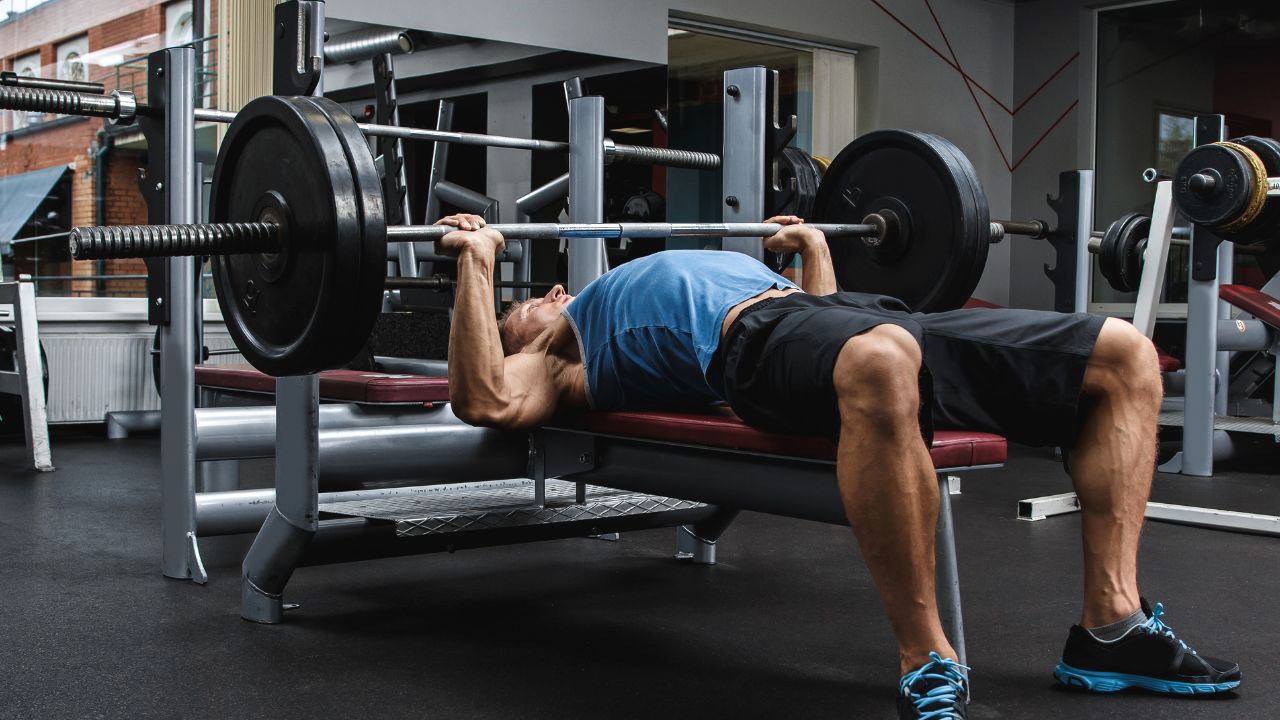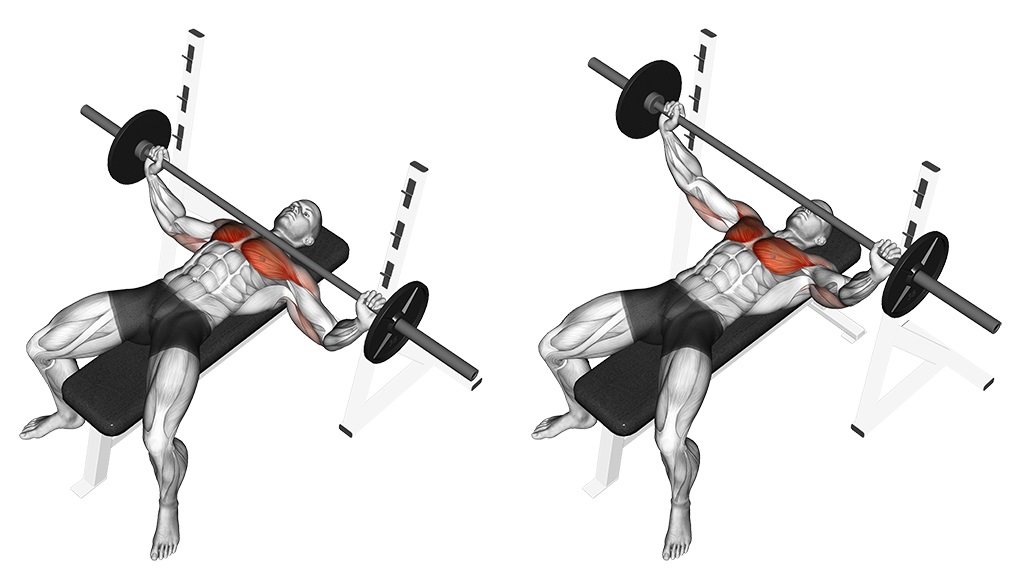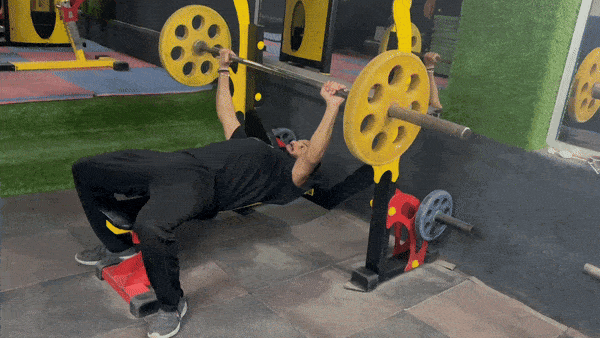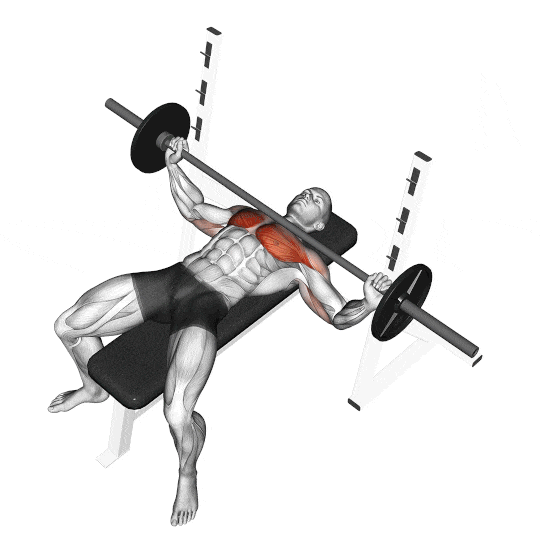The wide-grip barbell bench press is a variation of the traditional flat barbell bench press that is used to develop the chest, triceps, and shoulders.
As the name suggests, the key difference lies in the hand placement on the bar—your hands are positioned significantly wider than shoulder-width apart.
With a wider grip, the angle between your humerus (upper arm bone) and your torso is greater at the bottom of the movement. This significantly stretches the pectoralis major, particularly the sternal (lower/middle) head.
The wider grip shortens the distance and angle your triceps work through (less elbow extension). This reduces the contribution of your triceps to the press.
Due to the shorter range of motion, some lifters may be able to handle slightly heavier loads compared to their standard bench press.
However, it comes with increased risk, particularly to the shoulders, if form is compromised, mobility is lacking, or individuals with pre-existing conditions attempt it.
Over the years, coaching various clients, I’ve found it to be a particular tool. I rarely program it for beginners; establishing a solid standard bench press foundation is almost always the priority.

- Wide Grip Bench Press Muscles Worked
- How To Do Wide Grip Barbell Bench Press
- Tips And Form
- Sets And Reps
- Best Variations of Wide-Grip Chest Press
- 1. Incline Wide Grip Bench Press
- 2. Decline Wide Grip Bench Press
- FAQ’s
- Is The Wide Grip Bench Press A Compound Exercise?
- What Is The Ideal Grip Width For A Wide-Grip Bench Press?
- References
Wide Grip Bench Press Muscles Worked
A wide-grip bench press engages more than one muscle as a compound exercise.
- Primary muscles worked: chest muscles (mainly the outer chest).
- Secondary muscles worked: deltoids (shoulders), Tricep brachii, and serratus anterior.
- Various stabilising muscles, including the rotator cuff, biceps, and core muscles, also help stabilise the body and the barbell during the exercise.

Note: A study comparing grip widths in bench pressing revealed that biceps brachii activity increased with wider grips, while triceps brachii activity decreased with wider grips.
Want to take your gains to the next level? Discover your daily calorie needs with our free TDEE calculator.
How To Do Wide Grip Barbell Bench Press

- Lie flat on your back on a sturdy bench. When the bar is racked, your eyes should be directly underneath it.
- Place your feet flat on the floor, wider than shoulder-width apart, providing a strong base. Avoid lifting your feet or letting them wander.
- Retract your shoulder blades together as if you’re trying to hold a pencil between them. This creates a stable “shelf” for the bar to land on, protects the shoulders, and allows for a slight, natural arch in your lower back. Your glutes should remain in contact with the bench.
- Grip the bar slightly wider than shoulder width with a full, pronated (overhand) grip. Wrap your thumbs securely around the bar. Never use a thumbless or “suicide” grip – it’s dangerous.
- Take a deep breath, brace your core, and have your spotter assist you in lifting the bar smoothly out of the hooks. Inhale and slowly lower the bar towards your lower chest/sternum.
- Exhale as you explosively but controlledly press the bar back up to the starting position. Simultaneously drive your feet into the floor. This leg drive helps initiate the movement and provides power.
- Extend your arms fully at the top, but avoid hyperextending your elbows forcefully. Keep tension in your chest or briefly pause.
- Do 8-12 reps for muscle growth.
- Move the bar back into the hooks. Before you release your grip, use your spotter’s help to ensure it’s securely seated.
Tips And Form
- Start with a light set to warm up and prepare the muscles and joints for heavy lifting. This can prevent injury and improve performance.
- Plant your feet firmly on the ground with sufficient pressure to create leg drive. Your feet should be positioned either directly under your knees or slightly behind them.
- Keep wrists neutral and stacked directly over your forearms. Allowing wrists to bend backward not only reduces force transfer but can lead to wrist pain and injuries over time
- Maintain a natural arch in your lower back, but don’t exaggerate it. Your head, upper back, and buttocks should remain in contact with the bench.
- Before unracking the bar, squeeze your shoulder blades together and down. This creates a stable platform, protects your shoulders, and optimizes chest engagement. Think about “putting your shoulder blades in your back pockets.
- Don’t go excessively wide. A common starting point is having your index or middle fingers on the powerlifting rings. The functional check: at the bottom of the lift, your forearms should be close to vertical when viewed from the front. Prioritise a width where you feel a stretch in your chest, not strain your shoulders.
- Keep your elbows slightly tucked towards your sides as you lower the bar. Aim for an angle roughly between 60 and 75 degrees relative to your torso, NOT flared out to 90 degrees.
- Perfect the Valsalva manoeuvre by taking a deep breath into your belly before unracking, holding this breath throughout the repetition, and briefly resetting between reps. This creates core stability and enhances force production.

Sets And Reps
The number of sets per week is based on your fitness level. The number of sets per week for a beginner is less than that for an advanced.
However, the number of reps depends on the goals you want to achieve, such as building muscle strength and boosting endurance.
But still maintainable with proper form.
- For muscle building, use a moderately heavy weight.
- For strength building, choose a heavier weight that makes the last rep of each set very challenging. .
- Choose a light to moderate weight for endurance training that can do 15–20 reps.
| Goal | Sets | Reps | Rest(sec b/w sets) |
| Strength Building | 3-5 | 4-6 | 90-120 |
| Muscle Building (Hypertrophy) | 3-4 | 8-12 | 60-90 |
| Endurance and Toning | 2-3 | 12-20 | 30-60 |
| General Fitness or Maintenance | 3 | 8-10 | 60-90 |
Best Variations of Wide-Grip Chest Press
The wide-grip barbell press can be done in different ways to suit your fitness level and your choice.
If you are new to performing a wide-grip bench press, you may want to modify the exercise a bit. One way is to use a lighter weight.
If you want to work different muscle fibers in the chest, try inclining and declining the wide-grip barbell press. You can make it more difficult by using heavier weights, but focus on form.
1. Incline Wide Grip Bench Press
If the flat wide grip targets the overall chest with an emphasis on the sternal (lower/middle) fibers, doing the wide grip bench press on an incline shifts the focus predominantly to the clavicular head of the Pectoralis Major – the upper chest.
The bench is positioned at an incline of 30–45 degrees, and the barbell is held at a distance greater than shoulder width apart.
The incline bench already places more stress on the anterior deltoid and shoulder joint than a flat bench.
Combining this with the wider grip’s inherent shoulder vulnerability means the Incline Wide Grip bench press is arguably the most stressful variation for the shoulder joint. Good shoulder mobility and control are absolutely essential.
2. Decline Wide Grip Bench Press
The decline wide-grip bench press is a great variation to target the lower portion of the chest.
The bench’s decline angle (typically 15-30 degrees) is specifically designed to align the pressing motion with the angle of the lower chest fibres.
A wider grip stance emphasizes the outer portion of the chest muscle more, giving your chest muscles a full and dense look.
Compared to incline, decline benching often feels less stressful on the anterior shoulder for some individuals because the humerus isn’t going into significant extension at the bottom. However, the wide grip still imposes considerable stress laterally across the shoulder joint and on the ligaments/tendons due to the leverage and required stability in a wide-grip position
To Stay Motivated: 150+ Gym Workout Motivational Quotes To Stay Fit
FAQ’s
Is The Wide Grip Bench Press A Compound Exercise?
Yes, the wide-grip bench press is a compound movement. It targets the tricep, chest, and shoulder muscles.
It is a very effective way to strengthen your upper body.
What Is The Ideal Grip Width For A Wide-Grip Bench Press?
The right grip for a wide-grip bench press depends on your body’s anatomy and flexibility.
- A slightly wider than shoulder-width-apart grip is the perfect starting point for most people.
- Try with different grip widths to see what suits you, and you feel most comfortable.
References
- Larsen Stian, Gomo Olav, van den Tillaar Roland “A Biomechanical Analysis of Wide, Medium, and Narrow Grip Width Effects on Kinematics, Horizontal Kinetics, and Muscle Activity on the Sticking Region in Recreationally Trained Males During 1-RM Bench Pressing Frontiers in Sports and Active Livin VOLUME = 2 (2021). DOI=10.3389/fspor.2020.637066 ISSN=2624-9367
- Saeterbakken AH, Mo DA, Scott S, Andersen V. The Effects of Bench Press Variations in Competitive Athletes on Muscle Activity and Performance. J Hum Kinet. 2017 Jun 22;57:61-71. doi: 10.1515/hukin-2017-0047. PMID: 28713459; PMCID: PMC5504579.
- Saeterbakken AH, Stien N, Pedersen H, Solstad TEJ, Cumming KT, Andersen V. The Effect of Grip Width on Muscle Strength and Electromyographic Activity in Bench Press among Novice- and Resistance-Trained Men. Int J Environ Res Public Health. 2021 Jun 14;18(12):6444. doi: 10.3390/ijerph18126444. PMID: 34198674; PMCID: PMC8296276.
- Green, Carly M. CSCS; Comfort, Paul MSc, CSCS The Affect of Grip Width on Bench Press Performance and Risk of Injury, Strength and Conditioning Journal: October 2007 – Volume 29 – Issue 5 – p 10-1l

Manish is a NASM-certified fitness and nutrition coach with over 10 years of experience in weight lifting and fat loss fitness coaching. He specializes in gym-based training and has a lot of knowledge about exercise, lifting technique, biomechanics, and more.
Through “Fit Life Regime,” he generously shares the insights he’s gained over a decade in the field. His goal is to equip others with the knowledge to start their own fitness journey.
